by Dan Phillips Tuesday's post
Tuesday's post was the second in the "Hello, Out There" series. As the comments tapered off, one came in which I think worthy of a more full (— Talbot grads don't say "f*ller"; to us, it
is "the f-word") reply. To wit:
ShyGuy said...
Speaking of unspoken premises, Dan, there's one thing that I simply can't get over, and it's the core assumption in both of your "Hello, Out There" discussions. Your assumption is "the Bible is true." The more I read on the topic, the more I try to get my faith back, the more I see the faultlines in the Bible. It just seems to make to much sense to examine Christology as a sort of mythological emergence; nothing was even really written about him for some 40 or 50 years after his death (a date I base on the current earliest known scrap of New Testament writing). It makes sense to me that the apostles, for reasons of their own, took a few unexplained things around Christ's life, magnified them, added many stories of their own, and built a mythology, a sort of rallying figure that might hold out promise to the fracturing Jewish nation. How can you believe all that as the divine revelation of God? I don't mean this arrogantly, it's just my biggest stumbling block right now (in fact, it has destroyed my faith; I no longer consider myself a believer). How can we believe that the Bible is true? |
|
First, I'm glad you asked.
Second, you're absolutely right. I don't write everything in every post. It's actually a temptation I have to fight — the temptation to try to say everything in every sermon, and write everything in every post. For me it takes discipline to try to pick one thing and focus on it alone. That's why this is a series. Lord willing, other things at other times.
Third, I have written at a bit more length about why I believe what I believe about Jesus and the Bible in an essay called
Why I Am (Still) a Christian. Check it out.
Fourth, I wonder what study you've done on this subject. Taking you at your word, it seems to me that you've given up an awful lot for no reason at all. Let's take this apart a bit.
"Nothing"? You say,
"nothing was even really written about [Jesus] for some 40 or 50 years after his death (a date I base on the current earliest known scrap of New Testament writing)."This is simply a naked assertion. Not only does it have no supportive evidence, but it is contrary to a huge pile of evidence. The New Testament Epistles write about Jesus, and they were written as early as twenty years after Jesus' resurrection. Luke was almost certainly written before the mid-sixties (thus within 30-35 years of that event), and he refers to earlier written accounts (Luke 1:1-4). Thus, your premise is incorrect.
Nihilism? But let's put that aside for a moment. Have you thought this through at all? Your assumption is, "We cannot know anything about something documented 40-50 years after the event." Do you realize that
no remotely credible historian alive would agree with you? Do you realize that this would lead to
total historical nihilism?
Put it another way. When you read
David McCullough on, say, John Adams or George Washington, or 1776, do you reject the whole as bosh because it is written more than
two centuries after the events? Or when you read of the Pharaohs, or the Battle of Carchemish, do you shrug and say "Whatever" because everything is written
millennia after the occurrences? Not likely.
Do you realize that most historians would (metaphorically, I trust)
kill to have the sorts of resources, the staggering wealth of early manuscript evidence, that the NT historian has about the life of Jesus?
Plus (just in passing), you speak as if these documents came from a vacuum, and dropped into a vacuum. Christianity took hold when vast throngs of eyewitnesses still lived. It gripped people with its truth to the extent that they were willing to die, and often did die, for the proposition that its central tenets were historical.
How much is enough? Again, taking you at your word that this is
the reason you class Jesus as a liar: how early would the documents have to be for you to believe? You say 40-50 years is too much of a gap. How about 39 years? But you're already there; Mark may well have been written within a couple of decades of the resurrection; Luke's sources certainly were written within three. 35 years? Already there. 30? Probably already there, in my judgment. What is your cut-off for historical certainty, how did you arrive at it, and on what basis?
To take that slightly differently, given that this was your stated reason for not being a Christian, and given that I've shown you that you were incorrect, will you believe in Jesus now? (BTW, a lot more documentation and reasoning is given in
a book I reviewed last year.)
You see, I'll just be very candid with you. In a few decades of talking to people who say they've left Christ, I have found a common factor. The reason they give is
never the real reason. They say "error in the Bible, Christians are mean, I hate church, God didn't obey one of my prayer-orders," or a dozen other things. And I'm sure those things feel, emotionally, very real to them.
But they're always red herrings. The real reason always comes from the world, the flesh, and/or the devil.
Always it's really that they wanted to
think, be, or do something they knew was wrong, and they'd feel a lot better about it if there were no living God such as Jesus reveals. They wanted to have sex with someone (or something) they knew they shouldn't, they wanted to take or become or do something they knew they shouldn't, and the only thing standing in the way was God. So they just attempt
intellectual deicide, come up with an alibi, and try to move on.
Dead giveaway #1. The first dead giveaway is that the alibi almost invariably evaporates under the most basic examination.
I'm not saying that's you. I'm just saying that, so far, the stats
in my experience are pretty high.
Dead giveaway #2. The second dead giveaway is that Real Central Unanswerable Challenge A, when it is knocked over, is
immediately replaced by Real Central Unanswerable Challenge B ("Oh yeah? Well... well... where did Cain get his wife? Huh? Huh?") And Real Central Unanswerable Challenge B, demolished, is immediately replaced by Real Central Unanswerable Challenge C, and then D, and then E, and on and on.
Because the
presenting issue is never the
real issue.
As different as you and I may be, we share the same
real issue; and that is something that I did talk about in
the previous post. Our issue is that our desires are contrary to the will and nature of God. He stands between us and what we want, because what we want is to "be as God"; we want "thy will be done" to be addressed to us. So whatever we tell ourselves and others, we

really don't want such a God as Jesus reveals. And that is why we characteristically
suppress the truth that God offers us (Romans 1:18).
But that is why Jesus came. He came as the first man ever
not to rebel, the first man ever perfectly to fulfill His Father's law in thought, word and deed. He fulfilled an intricate labyrinth of prophecy, lived a life marked off by the touch of God from first to last. He died under God's wrath, as a substitute, bearing the guilt of innumerable rebels, so that He might reconcile them to God.
The reason His death was of such infinite value is that He was God incarnate, as the Old Testament had said He would be (cf. Isaiah 7:14; 9:6). God the Son lived a perfect life empowered by God the Holy Spirit, made the perfect sacrifice to appease God's wrath; and God the Father signaled His acceptance of that sacrifice by raising Christ bodily from the dead.
So the great good news,
Shyguy, is that whatever particular issues you may feel you have, your
real issues and mine are dealt with in Christ. Agree with God about His Son, rest your faith on Him as your Lord and your Savior.
Now there's a rock you can build on.
(For more about how and why to know God,
read here.)

 o our flight from Minneapolis was delayed two hours, giving us an additional 4-hour layover in Salt Lake City.
o our flight from Minneapolis was delayed two hours, giving us an additional 4-hour layover in Salt Lake City. I'm sitting here checking e-mail and drinking a root beer, and I looked up at an arriving flight just in time to see the baggage handlers showing up to unload a plane. I've never actually watched what these guys do.
I'm sitting here checking e-mail and drinking a root beer, and I looked up at an arriving flight just in time to see the baggage handlers showing up to unload a plane. I've never actually watched what these guys do.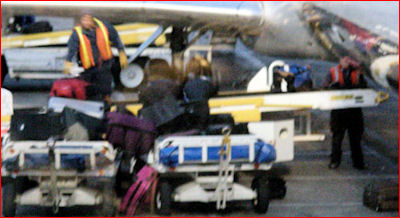


 he tendency of the day is to give up old landmarks and to adopt new ones, and to avow anything rather than the old-fashioned divinity.
he tendency of the day is to give up old landmarks and to adopt new ones, and to avow anything rather than the old-fashioned divinity.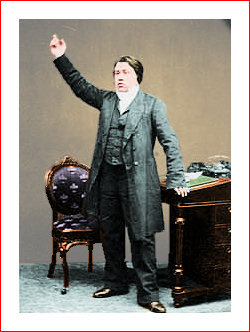 Well, my dear friends, if any of you like to try new doctrines, I warn you, that if you be the children of God you will soon be sick enough of those new-fangled notions, those newly invented doctrines, which are continually taught. You may, for the first week, be pleased enough with their novelty; you may wonder at their transcendental spirituality or something else that entices you on; but you will not have lived on them long before you will say, "Alas! alas! I have taken in my hands the apples of Sodom; they were fair to look upon, but they are ashes in my mouth."
Well, my dear friends, if any of you like to try new doctrines, I warn you, that if you be the children of God you will soon be sick enough of those new-fangled notions, those newly invented doctrines, which are continually taught. You may, for the first week, be pleased enough with their novelty; you may wonder at their transcendental spirituality or something else that entices you on; but you will not have lived on them long before you will say, "Alas! alas! I have taken in my hands the apples of Sodom; they were fair to look upon, but they are ashes in my mouth."
 inneapolis.
inneapolis. 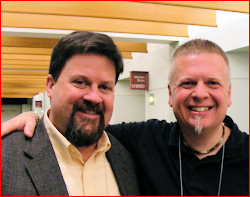 Longtime readers will recognize the great Marc Heinrich, blogmaster of one of the best Christian blogs of all time, the once-legendary (but now virtually defunct)
Longtime readers will recognize the great Marc Heinrich, blogmaster of one of the best Christian blogs of all time, the once-legendary (but now virtually defunct)  Incidentally,
Incidentally, 












 was my 497th birthday (52 in calendar years).
was my 497th birthday (52 in calendar years).






 oug Pagitt has explained
oug Pagitt has explained  Todd Friel, who featured this on last Monday's second hour of Way of the Master Radio. I get WOTM's podcasts daily but usually have to catch up with my listening on the weekends, so I did not hear this segment (or even know about it) until Saturday, when I listened to it on my way home from a conference in Bakersfield. Since it sheds further light on
Todd Friel, who featured this on last Monday's second hour of Way of the Master Radio. I get WOTM's podcasts daily but usually have to catch up with my listening on the weekends, so I did not hear this segment (or even know about it) until Saturday, when I listened to it on my way home from a conference in Bakersfield. Since it sheds further light on 
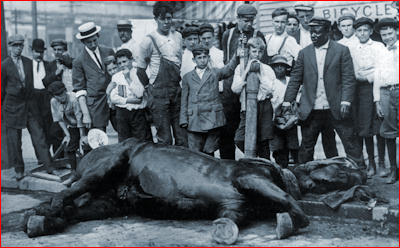

 ill we are rooted and grounded in the truth, new things have great charms for us, especially if they have about them a great show of holiness and zeal for God.
ill we are rooted and grounded in the truth, new things have great charms for us, especially if they have about them a great show of holiness and zeal for God.
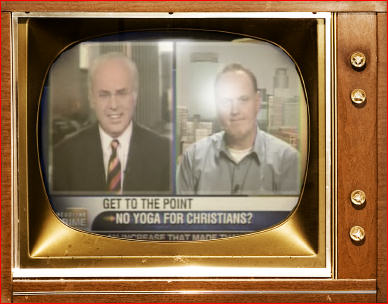
 oug Pagitt's recent performance on CNN was documented last week by several bloggers, including
oug Pagitt's recent performance on CNN was documented last week by several bloggers, including 

 In that respect, when we use the word "church" in English, we get a little lost because we get confused about whether the text means "those called out by God" or "First Institutional Building with HQ in Memphis, TN". Because in one sense -- the sense in Mt 16 here -- Jesus is talking about the whole assembly of believers throughout the ages.
In that respect, when we use the word "church" in English, we get a little lost because we get confused about whether the text means "those called out by God" or "First Institutional Building with HQ in Memphis, TN". Because in one sense -- the sense in Mt 16 here -- Jesus is talking about the whole assembly of believers throughout the ages. # Each church and all its members are obligated to pray constantly for the good and prosperity of all Christ's churches everywhere, and to help forward everyone who comes into their district or calling, by the exercise of their gifts and graces. It clearly follows that when churches are planted by the goodness of God they ought also to hold fellowship among themselves to promote peace, increasing love and mutual edification as and when they enjoy an opportunity to do so to their advantage.
# Each church and all its members are obligated to pray constantly for the good and prosperity of all Christ's churches everywhere, and to help forward everyone who comes into their district or calling, by the exercise of their gifts and graces. It clearly follows that when churches are planted by the goodness of God they ought also to hold fellowship among themselves to promote peace, increasing love and mutual edification as and when they enjoy an opportunity to do so to their advantage.
 Put it another way. When you read
Put it another way. When you read  really don't want such a God as Jesus reveals. And that is why we characteristically
really don't want such a God as Jesus reveals. And that is why we characteristically 








